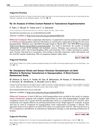 16 citations,
January 2007 in “Journal of Obstetrics and Gynaecology”
16 citations,
January 2007 in “Journal of Obstetrics and Gynaecology” The document suggests various treatments for PCOS, including medication for menstrual issues, insulin resistance, and excess hair, as well as fertility treatments, while highlighting the need for personalized care and lifestyle changes.
 12 citations,
October 2004 in “Expert Opinion on Investigational Drugs”
12 citations,
October 2004 in “Expert Opinion on Investigational Drugs” Treatments for Polycystic Ovary Syndrome (PCOS) focus on reducing symptoms, restoring regular periods, and helping with pregnancy. Common treatments include hormone suppressors, fertility drugs, and insulin-sensitising agents.
 9 citations,
January 2015 in “Springer eBooks”
9 citations,
January 2015 in “Springer eBooks” The document concludes that managing PCOS involves treating symptoms, regulating periods, and reducing health risks, with specific medications for fertility and metabolic issues.
 4 citations,
July 2017 in “Medicine”
4 citations,
July 2017 in “Medicine” The document concludes that managing PCOS involves lifestyle changes, medication for symptoms, and weight loss for fertility improvement.
 4 citations,
June 2007 in “PubMed”
4 citations,
June 2007 in “PubMed” Effective management of PCOS includes lifestyle changes, medication for menstrual regulation, fertility treatments, and cosmetic issue remedies.
 3 citations,
April 2020 in “Clinical endocrinology and metabolism journal”
3 citations,
April 2020 in “Clinical endocrinology and metabolism journal” Imaging helps detect adrenal gland issues and monitor treatment in congenital adrenal hyperplasia, and can identify tumors affecting fertility.
 3 citations,
August 2017 in “International journal of reproduction, contraception, obstetrics and gynecology”
3 citations,
August 2017 in “International journal of reproduction, contraception, obstetrics and gynecology” People with PCOS have higher levels of PAI-1, which may increase their risk of heart disease and fertility issues.
 2 citations,
January 2014 in “Elsevier eBooks”
2 citations,
January 2014 in “Elsevier eBooks” The document explains how sperm cells are produced, the role of testosterone in this process, and how toxins can reduce sperm count and fertility.
 1 citations,
March 2011 in “Infertility”
1 citations,
March 2011 in “Infertility” Hormone imbalances from the pituitary, thyroid, and adrenal glands can cause infertility, but treating these disorders can improve fertility.
Genetic analysis of rabbits identified key genes for traits like coat color, body size, and fertility.
 November 2023 in “International journal of reproduction, contraception, obstetrics and gynecology”
November 2023 in “International journal of reproduction, contraception, obstetrics and gynecology” Polycystic ovary syndrome causes high male hormone levels, leading to symptoms like excess hair, acne, and fertility problems.
 April 2023 in “Elsevier eBooks”
April 2023 in “Elsevier eBooks” PCOS is a hormonal disorder causing symptoms like excess hair, acne, irregular periods, and fertility issues.
 April 2023 in “Elsevier eBooks”
April 2023 in “Elsevier eBooks” PCOS is a common and costly condition in North American women, causing various health issues like obesity, diabetes, and fertility problems.
 August 2022 in “IntechOpen eBooks”
August 2022 in “IntechOpen eBooks” Congenital Adrenal Hyperplasia is a rare inherited disease causing hormone imbalances, affecting growth, fertility, and heart health, diagnosed through blood tests and treated with medication and lifestyle changes.

Polycystic ovary syndrome (PCOS) affects about 10% of women, is often linked to obesity and family history, and can cause irregular periods, fertility issues, and other symptoms. It's usually managed with lifestyle changes, weight loss, and medication.
 September 2018 in “The Journal of Urology”
September 2018 in “The Journal of Urology” Clomiphene citrate is a cheap and simple treatment for low testosterone that works as well as human chorionic gonadotropin, alone or combined, especially for men who want to keep their fertility.
August 2020 in “DOAJ (DOAJ: Directory of Open Access Journals)” Finasteride, at doses of 5mg or higher, may negatively affect male fertility by reducing the expression of certain genes involved in sperm production.
 October 2012 in “Faculty Opinions – Post-Publication Peer Review of the Biomedical Literature”
October 2012 in “Faculty Opinions – Post-Publication Peer Review of the Biomedical Literature” Six new genes linked to early hair loss were found, which also surprisingly connect to Parkinson's disease and lower fertility.
 October 2012 in “Faculty Opinions – Post-Publication Peer Review of the Biomedical Literature”
October 2012 in “Faculty Opinions – Post-Publication Peer Review of the Biomedical Literature” Six new genes linked to early hair loss were found, which also surprisingly connect to Parkinson's disease and lower fertility.
 5 citations,
December 2021 in “Physiological Research”
5 citations,
December 2021 in “Physiological Research” Men, particularly those with hair loss, are more likely to get the virus, and those with prostate cancer may have milder symptoms. Testosterone's role in the disease is unclear, and the virus doesn't seem to harm male fertility. Women with PCOS might be at higher risk. More research is needed.
 1514 citations,
December 2011 in “Fertility and sterility”
1514 citations,
December 2011 in “Fertility and sterility” Experts agree that PCOS affects women's health in complex ways, but more research is needed to understand and treat it effectively.
 855 citations,
June 2009 in “The Journal of Clinical Endocrinology & Metabolism”
855 citations,
June 2009 in “The Journal of Clinical Endocrinology & Metabolism” The guideline recommends mental health involvement in diagnosing gender identity disorder and outlines hormone and surgical treatment protocols, emphasizing safety, informed consent, and long-term monitoring.
 257 citations,
July 2018 in “Obstetrics & Gynecology”
257 citations,
July 2018 in “Obstetrics & Gynecology” PCOS is a complex disorder in women that can lead to various health risks and requires personalized treatment.
 222 citations,
January 2014 in “International journal of reproductive medicine”
222 citations,
January 2014 in “International journal of reproductive medicine” Insulin resistance and obesity are key factors in the development and worsening of polycystic ovary syndrome, and lifestyle changes are important for managing it.
 166 citations,
October 2018 in “Endocrine Reviews”
166 citations,
October 2018 in “Endocrine Reviews” Hormone treatments for transgender individuals generally improve mental health and physical transition, with some health risks that require medical supervision.
 117 citations,
May 2017 in “Human Reproduction Update”
117 citations,
May 2017 in “Human Reproduction Update” The update highlights that non-classic congenital adrenal hyperplasia is common in women with excess male hormones, requires specific hormone tests for diagnosis, and has various treatment options depending on age and symptoms.
 99 citations,
August 2003 in “Fertility and Sterility”
99 citations,
August 2003 in “Fertility and Sterility” Too much male hormone is the main cause of Polycystic Ovary Syndrome.
 91 citations,
April 2017 in “Diabetes & Metabolic Syndrome: Clinical Research and Reviews”
91 citations,
April 2017 in “Diabetes & Metabolic Syndrome: Clinical Research and Reviews” Eating fewer calories, less sugar and refined carbs, and more low-glycemic and omega-3 rich foods can help manage PCOS symptoms.
 58 citations,
December 2018 in “Nature Communications”
58 citations,
December 2018 in “Nature Communications” Male pattern baldness is mostly inherited, involves many genes, and is linked to other traits like early puberty and strong bones.
 45 citations,
March 2015 in “Clinical Endocrinology”
45 citations,
March 2015 in “Clinical Endocrinology” Testosterone therapy is generally safe for transmen, improves sexual function, and has manageable health risks with proper monitoring.



























